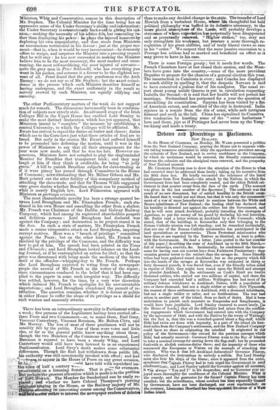• The other Parliamentary matters of the week do not
suggest much for remark. The discussions have mostly been in continua- tion of subjects now utterly stale. An advanced stage of the Irish Colleges Bill in the Upper House has enabled Lord Stanley to make the most distinct declaration which has yet appeared, that Ministers intend to " complete " the measure by establishing a antral University, to which the Colleges will be affiliated. Mr. Ewart has striven to repeal the duties on butter and cheese; duties *Inch are to the Corn-laws just what those articles of food are to bread. But early in the session Mr. Ewalt had suffered himself to be persuaded into deferring the motion, until it was in the power of Ministers to say that all their arrangements for the year were now made, and that he was too late. However un- generous, Ministers have not scrupled to play the singleminded Member for Dumfries that transparent trick ; and they may laugh at him if they think it creditable, for being "so jolly ereen." A hill to punish Brazilian subjects for slave-trading as if it were piracy has passed through Committee in the House of Commons • notwithstanding that Mr. Milner Gibson and Mr. Hutt pointed' out the utter futility of this compulsory method of attacking the slave-trade, and that Sir Thomas Wilde suggested very grave doubts whether Brazilian subjects can be punished by *hat is merely English law. Lord Palmerston appeared with Ministers art partieeps en mi air.
The most characteristic novelty has been a strange quarrel be-
een Lord Brougham and Mr. Fitzstephen French; each sta- tioned in his own House and assaulting the other from a shelter. M. French was Chairman of the Dublin and Galway Railway Company, which had among its registered shareholders paupers and fictitious persons : Lord Brougham had declared war against the Company; and destruction to its_project stared it in the face. In such a state of matters, Mr. Fitzstephen French made a coarse vituperative attack on Lord Brougham, imputing corrupt motives. Here was a "breach of privilege" committed against the Peers ; but on the other hand, Mr. French was shielded by the privilege of the Commons, and the difficulty was how to get at him. The speech had been printed in the Times and Chronicle; and Lord Brougham looked askance on the Lead- ing Journal, as if he contemplated an action for libel ; so that the press was threatened With being made the medium of the blows dealt at the offender—whipping-boy to Mr. French. Perhaps also Lord Brougham expected to wring from the newspaper- people the avowal of Mr. French as the writer of the report ; since circumstances conduced to the belief that it had been sup- plied to the papers in some such irregular way. The difficulty was settled, however, for the time by a very wise discretion Which induced Mr. French to apologize for his unwarrantable iinputations; and Lord Brougham abandoned the pursuit of re- tribution. The question remains, whether it is decent or politic in either House to suffer the abuse of its privilege as a shield for such wanton and unseemly attacks.


























 Previous page
Previous page